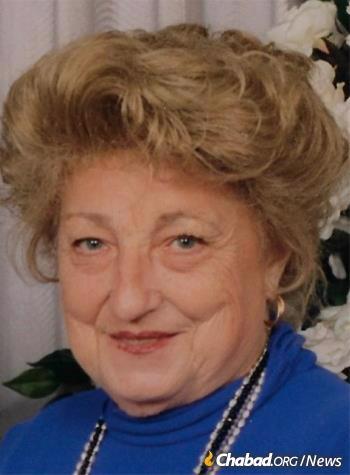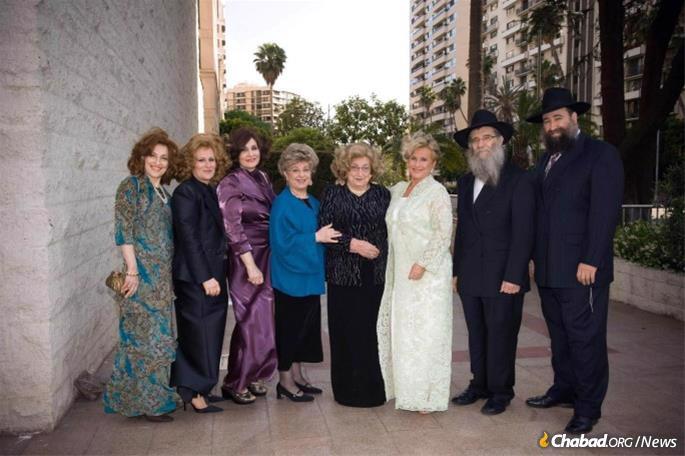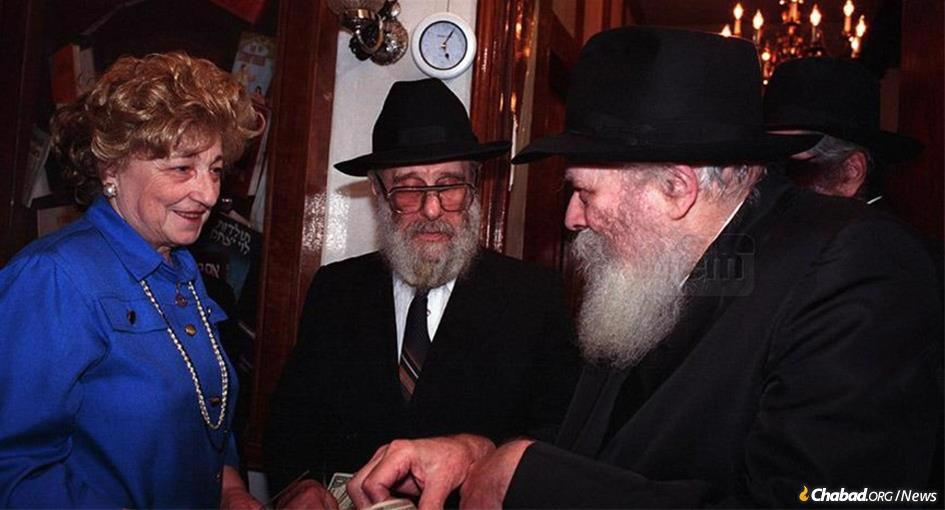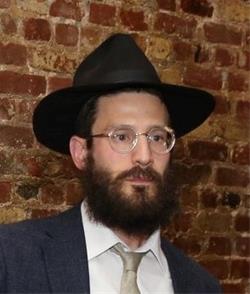Guta Schapiro, the matriarch of a large Chabad-Lubavitch family who lived through many hardships in the Soviet Union, passed away on March 27. She was 99 years old.
Born in a small town in Crimea, Schapiro was the daughter of the venerable Chassid Reb Peretz Mockin, a man known for his inimitable dedication and self-sacrifice, with a heart so generous that his wife would have to hide their meager monies so he wouldn’t give it away to others.
These qualities of devotion, self-sacrifice and caring for another were deeply ingrained in his daughter, and were her character trademarks.
Life in the Soviet Union wasn’t easy for Jewish families, and as staunch followers of the Sixth Rebbe—Rabbi Yosef Yitzchak Schneersohn, of righteous memory—it was doubly so for the family of young Guta. Despite the tremendous risk involved, her father did not send her to Soviet public schools, paying a personal tutor to teach her Judaic studies—a rarity for any Jewish woman at the time.
After moving to the larger city of Simferopol, also in the Crimea, she eventually made her way to the metropolis of St. Petersburg in the pre-war years, then known as Leningrad. The Sixth Rebbe was residing there at the time. It was there that she met her husband, Rabbi Levi Yitzchak Schapiro, in 1941. They were wed two weeks before the German armies of World War II reached the Soviet capital of the north.
Confined to the grueling task of trench-digging for the war effort, her early married years were quite challenging, but never diminished her regal demeanor and unwavering devotion to her faith, say her grandchildren. Along with many other Lubavitcher Chassidim at the time, she eventually fled with her husband to the remote city of Tashkent, Uzbekistan, to be further away from the reach of the omnipresent arm of the Soviet authorities and the advancing Nazi Holocaust.
After the war, in 1946, she moved with her family to Paris, where Rebbetzin Chana, the mother of the Rebbe, Rabbi Menachem M. Schneerson, of righteous memory, was living. After seven years in the French capital, through the efforts of the Hebrew Immigrant Aid Society (HIAS), the Schapiro family was eventually relocated to Cleveland in the summer of 1953.

To be in the United States but still so many miles away from the Rebbe in New York was a painful predicament for the Schapiros. So after 10 years in Ohio, in 1963, the Schapiros finally relocated to New York, settling in an apartment across the street from the Rebbe’s headquarters on the sweeping boulevard of Eastern Parkway in the Crown Heights neighborhood of Brooklyn, N.Y.
From that apartment, and later from a modest home on another street just down the main avenue, Guta Schapiro reigned as matriarch and a loving, listening ear to hundreds. Whether it was droves of guests passing through her home or countless nights standing by her husband as he filled his role as leader of the chevra kadisha and as a community activist, Guta was the stalwart of her family—all with a loving, intelligent demeanor.
Legendary Hostess

“The hachnasat orchim [hospitality] in our home was legendary,” said her daughter, Hinda Gurewitz. “It didn’t make a difference who it was, my mother always made them feel completely comfortable.”
Her grandson, Rabbi Lazer Lazaroff, who now co-directs Chabad at Texas Medical Center, lived in their home during his formative schooling years. Unique even among Chabad centers, Lazaroff runs a hospitality home for visitors to the various medical centers he serves. “I can say that a large part of what drives my current passion for hospitality is from my grandmother. Growing up in her home—no matter the person, no matter how late it was—it didn’t matter. What really struck me was that not only wasn’t it a burden for her, she was downright excited at the opportunity to serve yet another person.
“My grandfather knew that he had carte blanche to bring whomever and however many people home, and my grandmother would be thrilled to host them.”
Even later, after moving back to Texas to serve together with his father and extended family in Chabad of Texas, when the Lazaroffs would send newly introduced Jews to headquarters in Crown Heights—Schapiro’s home was the address. And, of course, she would eagerly adopt them, expanding her “Bubby” status far beyond her biological descendants.
“She wasn’t just a matriarch to her family, but a caring Bubby to everyone she came across,” said her grandson.

A Bridge to the Past
Born to a family of generational Chassidic stock, Schapiro was fiercely proud of the Chassidic passion inscribed in her very DNA. Of particularly sharp mind and remarkable memory, she was a veritable treasure trove of Chassidic tradition and lore.
“Due to her advanced age and vivid memory, people have told me that my mother was a bridge to the past,” said her son, Rabbi Nachman Schapiro. Indeed, Chassidic life is a two-sided edifice of both study and tradition, and it is people like her who held the keys to the latter. Privileged as she was to grow up in a home so steeped in Chassidic tradition, Schapiro was witness to countless gems of that passion and spirit.
“She would regale us with stories from the past,” recalls Lazaroff. “I remember her telling us of the esteemed Chassid Itche Der Masmid [Rabbi Yitzchak Horowitz], who would come to visit. Though the house was just one room, he would stay with them and sleep in the available floor space—under the table. She told us of how she woke in the middle of the night to see him studying Torah, his feet in ice water to keep him awake.”
Her father was both a shochet and a mohel. Ever the devoted Chassid, he would travel around the Soviet Union, offering his vital religious services to Jews everywhere. As it so happened, when her youngest brother, Rabbi Berel Mockin, was born, Guta’s father was away on one such trip, and so at the tender age of 16, she was elected to trek to the hospital to pick up her mother and new baby.
It was this devotion and love that carried through her entire life. Her son, Rabbi Nachman Schapiro, was one of the members of the team of chozrim ("reviewers") who would record the Rebbe’s talks. “I remember bringing my friends home after farbrengens, and my mother would be thrilled to serve us. Her pastries and post-farbrengen goodies were legendary; for her, she had no greater joy than to continue the Chassidic traditions she received from her parents,” he recalled.
Personally as well, she was scrupulous with halachah (Jewish law) and regally refined in all her dealings. “Even in her last days, while in the hospital, my mother wouldn’t eat the food out of concern that it wasn’t full kosher” said Gurewitz. “Every month, she always made sure to bless the new month, and whatever else was going on in her life, she always meticulously kept to her faith. She was a refined and intelligent woman, and never stood for what she perceived as American chutzpah.”
Schapiro passed away on March 27, the second day of Nissan, the 100th yahrtzeit of the Rebbe Rashab.
She was predeceased by her husband.
She is survived by their children: Raizel Schreiber (Bal Harbour, Fla.); Chiena Lazaroff (Houston); Rabbi Nachman Schapiro (Brooklyn, N.Y.); Fradel Mishulovin (Brooklyn, N.Y.); Shterna Sara Krinsky (Brooklyn, N.Y.); Hindy Gurwitz (Brooklyn, N.Y.); Rabbi Nochum Schapiro (Sydney); by her brother, Rabbi Berel Mochkin of Montreal; and by many grandchildren, great-grandchildren and great-great-grandchildren.






Join the Discussion